“Unlock the power of nature with Organic Moringa Superfood Powder! Packed with essential nutrients, antioxidants, and vitamins, this all-natural booster is your key to enhanced energy, improved digestion, and vibrant health. Perfect for smoothies, meals, and snacks, Moringa Superfood Powder is your daily wellness ally for a supercharged lifestyle. Elevate your health journey today!”
Introduction
In the bustling life of the 21st century, maintaining optimal health has become more crucial than ever. Among the plethora of superfoods vying for attention, organic Moringa powder stands out as a powerhouse of nutrients, capable of supercharging your day unlike any other. This article delves into the myriad of benefits offered by this green marvel, guiding you through its nutritional profile, health benefits, and how to seamlessly incorporate it into your daily routine.
Table of Contents
What is Organic Moringa?
Originating from the Moringa oleifera tree, native to parts of Africa and Asia, Moringa has been revered for centuries for its medicinal properties. It’s a nutrient-dense plant, packed with vitamins, minerals, and antioxidants. Organic Moringa powder is made from the dried leaves of the tree, ensuring that the purity and potency of its health benefits are preserved without the use of harmful pesticides or chemicals.

Health Benefits of Organic Moringa Powder
- Rich Nutritional Profile: Moringa powder is high in vitamins A, C, and E, calcium, potassium, and protein, making it a great addition to help meet your nutritional needs and improve overall health.
- Boosts Energy Levels: Due to its high iron content, Moringa powder can help in improving energy levels, reducing tiredness and fatigue. Iron is essential for the formation of hemoglobin which transports oxygen around the body, thereby increasing energy.
- Supports Immune System: With its high vitamin C content and natural antibacterial, antifungal, and antiviral properties, Moringa powder can strengthen the immune system, helping the body ward off infections and illnesses.
- Antioxidant Properties: Moringa is rich in antioxidants like quercetin, chlorogenic acid, and beta-carotene. These compounds can protect the cells from damage caused by free radicals, reducing the risk of chronic diseases such as heart disease and type 2 diabetes.
- Promotes Heart Health: The antioxidants in Moringa powder can help lower blood pressure and reduce fat accumulation in the arteries, thereby promoting heart health.
- Anti-Inflammatory Effects: The isothiocyanates in Moringa powder have been shown to have anti-inflammatory properties, which can help reduce inflammation and associated health issues like arthritis.
- Enhances Skin and Hair Health: Moringa powder’s high content of vitamins A and E supports the maintenance and repair of skin cells and hair. Its antioxidant properties can also protect the skin against aging and the effects of UV radiation.
- Aids Digestion: Being a good source of fiber, Moringa powder can help in maintaining a healthy digestive system, preventing constipation, and supporting gut health.
- Improves Mental Clarity: Moringa powder can support brain health due to its antioxidant properties and high levels of vitamins E and C. It can improve brain function, enhancing memory and mental clarity.
- Supports Weight Management: The fiber content in Moringa powder can also aid in weight management by promoting a feeling of fullness, reducing cravings, and assisting in the regulation of metabolism.
- Blood Sugar Regulation: Several studies suggest that Moringa powder may help in lowering blood sugar levels, making it beneficial for people with diabetes or those at risk of developing the condition.
Incorporating Organic Moringa into Your Diet
1. Start with Smoothies
One of the easiest ways to enjoy Moringa powder is by adding it to your morning smoothie. Its mild, earthy flavor blends well with fruits and vegetables. A teaspoon of Moringa powder in your smoothie can boost its nutritional value significantly.
2. Enhance Your Breakfast
Sprinkle Moringa powder over your oatmeal, yogurt, or cereal to kickstart your day with an extra dose of nutrients. It mixes well and adds a subtle flavor along with a multitude of vitamins and minerals.
3. Green Juices
For a quick and nutritious drink, add Moringa powder to your green juices. It pairs well with ingredients like cucumber, celery, apple, and lemon, creating a health-packed beverage that energizes you instantly.
4. Soups and Salads
Incorporate Moringa powder into soups and salads for an additional nutrient punch. You can blend it into salad dressings or sprinkle it directly onto salads. When added to soups, it thickens the broth slightly and enriches the dish with its healthful properties.
5. Baked Goods
Moringa powder can be a great addition to baked goods such as bread, muffins, and pancakes. Replace a small amount of flour with Moringa powder in your recipes to make your baked treats not only tastier but also more nutritious.
6. Teas and Lattes
Create a calming Moringa tea by steeping the powder in hot water. You can also mix Moringa powder into your morning latte for a healthy, energizing start to your day.
7. Energy Bars and Balls
For a quick, healthy snack, add Moringa powder to your homemade energy bars or balls. Combine it with nuts, seeds, oats, and your choice of sweetener for a nutritious snack.
8. Cooking with Moringa
Moringa powder can be added to various dishes, including curries, stews, and stir-fries. It adds a nutrient boost without overpowering the flavors of the dish.
Tips for Incorporating Moringa Powder:
- Start Slowly: If you’re new to Moringa, start with a small amount (e.g., 1/2 teaspoon per day) and gradually increase to avoid any digestive discomfort.
- Quality Matters: Ensure you’re using high-quality, organic Moringa powder to avoid contaminants and pesticides.
- Heat Sensitivity: While Moringa powder can be cooked, some nutrients are sensitive to heat. For maximum health benefits, consider adding it to dishes at the end of cooking or use it in raw recipes.
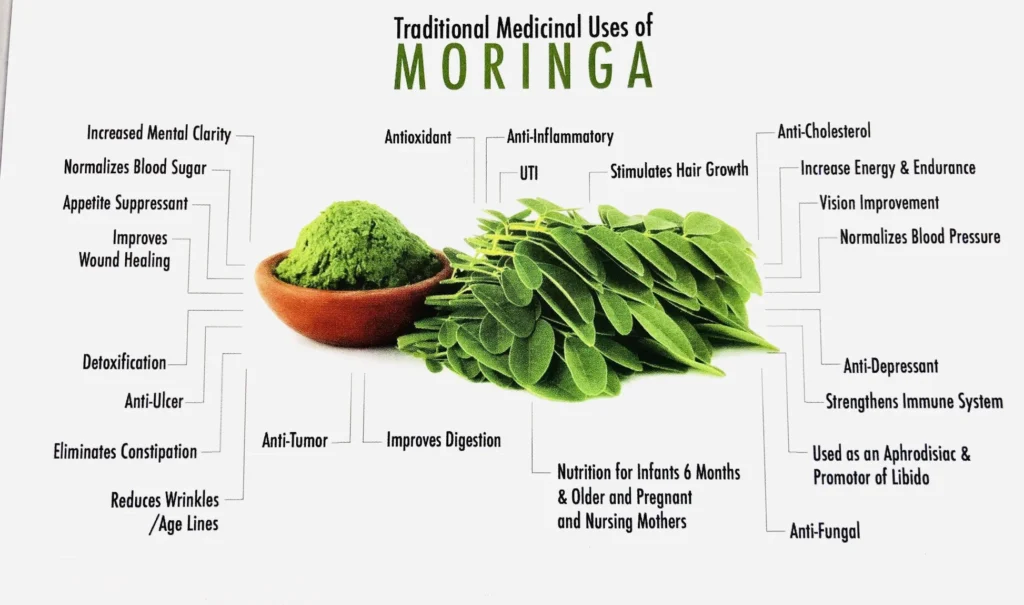
The Science Behind Moringa’s Power
Nutritional Profile
Moringa leaves are an excellent source of many vitamins and minerals. Just 100 grams of dry Moringa leaf contains:
- Vitamin A: 10 times more than in carrots, which is vital for the health of our eyes and immune system.
- Vitamin C: 7 times more than in oranges, essential for repairing tissues and enzymatic production of certain neurotransmitters.
- Calcium: 17 times more than in milk, crucial for bone health and muscular function.
- Protein: High-quality protein with all 9 essential amino acids, rare for a plant, making it an excellent protein source for vegetarians.
- Iron: 25 times more than in spinach, important for the formation of hemoglobin and enzymes, transporting oxygen to the body’s tissues.
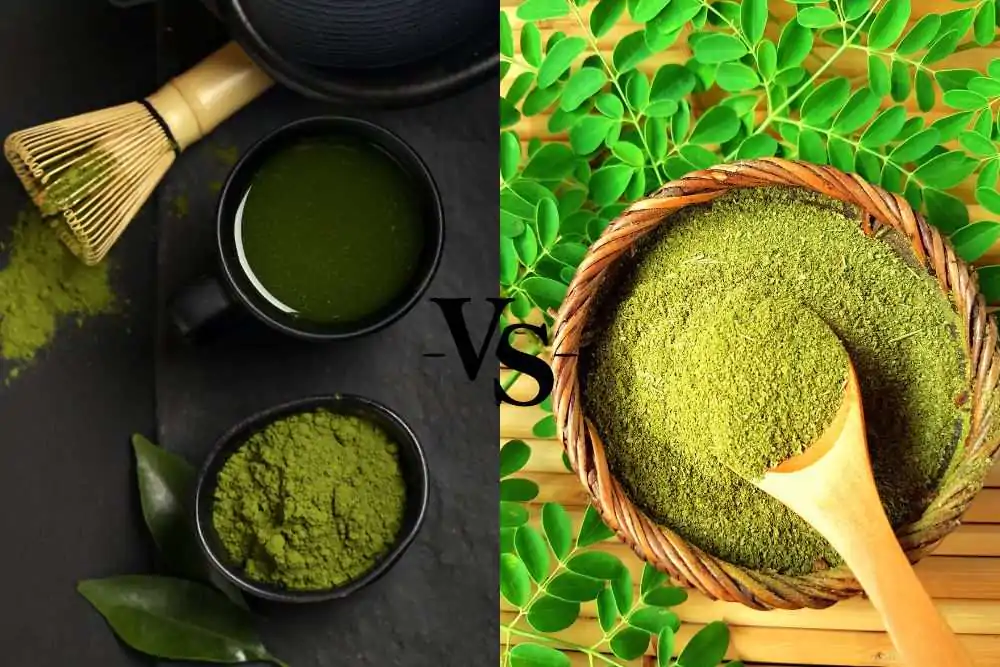
Antioxidants Galore
Moringa powder is packed with antioxidants, such as quercetin, chlorogenic acid, beta-carotene, and vitamin C. These antioxidants fight free radicals in your body, which can cause oxidative stress linked to chronic diseases like heart disease and type 2 diabetes. Quercetin, for example, is known to help lower blood pressure, while chlorogenic acid, also found in high amounts in coffee, may help moderate blood sugar levels after meals.
Anti-inflammatory Properties
The isothiocyanates in Moringa are major contributors to its anti-inflammatory properties. Chronic inflammation can lead to several health problems, including cardiovascular diseases and cancer. The bioactive compounds in Moringa can significantly lower inflammation by suppressing inflammatory enzymes and proteins in the body.
Heart Health
Moringa leaf powder has heart-healthy benefits, particularly in blood lipid control, the prevention of plaque formation in the arteries, and reduced cholesterol levels. These effects are attributed to its antioxidant properties, which help fight oxidative damage that can lead to heart disease.
Supporting Brain Health
Moringa’s high antioxidant content not only supports brain health but also has been shown to enhance cognitive function. This is because antioxidants can reduce neuron degeneration and improve brain function. It’s also rich in vitamins E and C, which can fight oxidation that leads to neuron degeneration, improving brain function.
Antimicrobial and Antifungal Properties
Moringa has antimicrobial and antifungal properties, thanks to compounds like pterygospermin, which is effective against the growth of fungi and microbes. This makes Moringa a valuable plant in the fight against infections.
Blood Sugar Control
Several studies have shown that Moringa oleifera may help lower blood sugar levels. This is crucial for people with diabetes or those at risk of developing the condition. The plant compounds found in Moringa, such as isothiocyanates, have been linked to reduced blood sugar levels through their effects on insulin secretion and action.
Organic Vs. Non-Organic Moringa Powder
Cultivation Practices
Organic Moringa Powder is produced from Moringa oleifera trees that are grown without the use of synthetic pesticides, herbicides, or fertilizers. Organic farming practices emphasize the use of natural substances and physical, mechanical, or biologically based farming methods to the fullest extent possible. Organic certification also requires adherence to certain soil and water conservation methods and the promotion of ecological balance, making organic Moringa more environmentally friendly.
Non-Organic Moringa Powder, on the other hand, may be cultivated using conventional farming practices that include the use of chemical pesticides, herbicides, and synthetic fertilizers. These substances can be used to promote plant growth and prevent disease, but they can also leave residue on the plant and potentially in the final powdered product.
Chemical Use and Residue
Organic Moringa is less likely to contain residues from pesticides and synthetic fertilizers due to the strict regulations governing organic farming. This can be particularly important for individuals concerned about the potential health effects of consuming chemical residues.
Non-Organic Moringa may have higher levels of chemical residues, depending on the agricultural practices used during cultivation. While these levels are typically within the limits deemed safe by regulatory agencies, some consumers prefer to avoid these chemicals altogether.
Nutritional Content and Health Benefits
Both organic and non-organic Moringa powders offer similar nutritional profiles, including vitamins, minerals, antioxidants, and amino acids. The method of cultivation does not significantly alter the inherent nutritional content of the Moringa leaves used to make the powder. However, some studies suggest that organic crops can have slightly higher levels of certain nutrients and antioxidants due to the more stress-resistant nature of plants grown organically.
Environmental Impact
Organic farming practices used to grow organic Moringa powder are generally more sustainable and environmentally friendly. They promote soil health, reduce pollution from runoff, and decrease the use of non-renewable resources. Organic farming also supports biodiversity and helps to preserve ecological balance.
Conventional farming methods used for non-organic Moringa can have a greater negative impact on the environment, including soil degradation, water contamination, and a reduction in biodiversity due to the use of synthetic chemicals.
Price and Availability
Organic Moringa Powder often comes at a higher price point than non-organic varieties. This price difference reflects the more labor-intensive methods of organic farming and the costs associated with maintaining organic certification. Organic Moringa may also be less readily available in some regions compared to its non-organic counterpart.
Non-Organic Moringa Powder is usually less expensive and more widely available, making it a more accessible option for some consumers.
Making a Choice
The decision between organic and non-organic Moringa powder ultimately depends on individual priorities, including health concerns, environmental impact, and budget. If minimizing exposure to chemical residues and supporting environmentally sustainable farming practices are important to you, organic Moringa powder may be the preferred choice. However, both organic and non-organic Moringa powders offer a wealth of health benefits that can contribute positively to a balanced diet.

Preparing Moringa Powder for Maximum Benefits
1. Start with Quality
- Choose Organic: Opt for organic Moringa powder to avoid the intake of harmful pesticides and fertilizers. Organic products are grown under stringent conditions that promote sustainability and reduce contaminants.
- Look for Purity: Ensure the Moringa powder is pure and free from fillers or additives. Pure Moringa powder will have a vibrant green color and a slightly earthy smell.
2. Correct Dosage
- Begin Slowly: If you’re new to Moringa powder, start with a small dose to allow your body to adjust. A recommended starting dose is ½ to 1 teaspoon per day.
- Listen to Your Body: Gradually increase the dosage based on your body’s response. Most adults can consume up to 2 teaspoons per day without adverse effects, but it’s important to heed any digestive discomfort or other signals from your body.

3. Effective Incorporation into Your Diet
- Cold Dishes: Moringa powder works well in cold dishes where its nutritional content remains intact. Sprinkle it over salads, blend into smoothies, or mix into salad dressings.
- Cook with Care: If adding Moringa powder to hot dishes, do so towards the end of cooking. Excessive heat can degrade some of its sensitive nutrients, such as vitamins C and E.
- Hydration: Moringa is rich in fiber, which can absorb water in the digestive system. Ensure you drink plenty of water throughout the day to aid digestion and absorption.
4. Versatile Use in Recipes
- Beverages: Mix Moringa powder into water, juices, or teas. For a quick and nutritious drink, blend it with fruits and vegetables in a smoothie.
- Breakfast Foods: Stir Moringa powder into oatmeal, yogurt, or cereal to fortify your breakfast with an extra nutrient boost.
- Snacks and Treats: Incorporate Moringa powder into homemade energy bars, protein balls, or baking recipes for healthier snack options.
5. Storage for Potency
- Keep It Cool and Dry: Store Moringa powder in a cool, dry place away from direct sunlight to preserve its nutritional value. Moisture can lead to spoilage, and excessive heat can degrade its nutrients.
- Airtight Containers: Use an airtight container to prevent exposure to air, which can oxidize and diminish the quality of the powder over time.
6. Regular Consumption
- Consistency is Key: For best results, incorporate Moringa powder into your diet regularly. Consistent intake can help you achieve and maintain the health benefits associated with its nutrients and bioactive compounds.
Customer Testimonials and Success Stories
Jane’s Journey to Improved Energy and Vitality
Jane, a 35-year-old software developer, found herself constantly battling fatigue and low energy levels, which affected her productivity and overall quality of life. After researching natural supplements, she decided to give Moringa powder a try. “Within just a few weeks of adding Moringa powder to my morning smoothies, I noticed a significant increase in my energy levels throughout the day. It felt like a cloud had been lifted,” she shares. Jane’s story is a testament to Moringa’s nutrient-rich profile, capable of boosting vitality and improving daily functioning.
Michael’s Management of Blood Sugar Levels
For Michael, a 50-year-old with type 2 diabetes, managing his blood sugar levels was a daily challenge. After hearing about Moringa’s potential benefits for blood sugar regulation, he was eager to test its effects. “I started incorporating a teaspoon of Moringa powder into my diet each day, and after a few months, my blood sugar readings became more stable than they’ve been in years,” Michael recounts. His experience underscores the potential of Moringa powder to support diabetes management as part of a holistic approach to health.
Lisa’s Weight Loss and Digestive Health Improvement
Lisa, a 28-year-old graphic designer, struggled with weight management and digestive issues. On a friend’s recommendation, she began using Moringa powder. “Adding Moringa to my meals helped curb my cravings and improved my digestion significantly,” Lisa says. “Not only did I start losing weight, but I also felt less bloated and more comfortable after meals.” Stories like Lisa’s highlight Moringa’s fiber content and its benefits for digestion and weight management.
Anita’s Enhanced Skin Health
Anita, a 42-year-old beauty blogger, was always on the lookout for natural ways to enhance skin health. After incorporating Moringa powder into her diet, she noticed remarkable changes. “My skin has never looked better! It’s clearer, more radiant, and even my fine lines have diminished,” Anita exclaims. Her experience speaks volumes about the antioxidant properties of Moringa powder and its role in promoting skin health.
Tom’s Recovery and Immune Support
Tom, a 38-year-old marathon runner, used Moringa powder to support recovery and boost his immune system. “Training for marathons can be taxing on the body. Since adding Moringa powder to my post-workout routine, I’ve noticed faster recovery times and fewer colds,” he notes. Tom’s story illustrates Moringa’s rich nutritional content and its potential to support physical recovery and immune health.
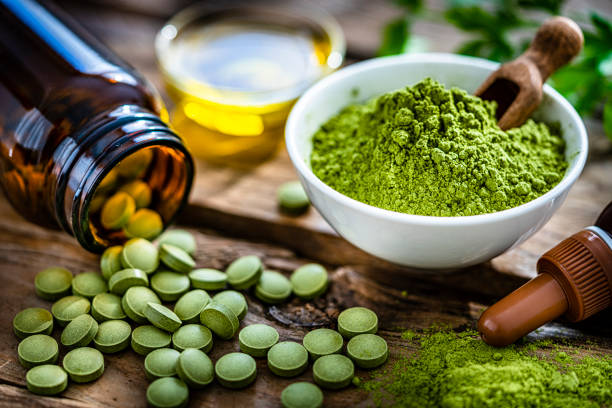
Source to Get Organic Moringa Leaf Powder Capsules
Frequently Asked Questions
- How much Moringa powder should I consume daily?
- Can Moringa powder help with weight loss?
- Is Moringa powder safe for everyone?
- How does Moringa powder compare to other superfoods?
- Where can I find organic Moringa powder?
Conclusion
Embracing organic Moringa superfood powder is a simple yet effective way to enhance your overall health and vitality. With its rich nutritional profile and wide-ranging health benefits, Moringa powder is a must-have in everyone’s diet. Start your journey towards a healthier, more vibrant life with this green superfood.
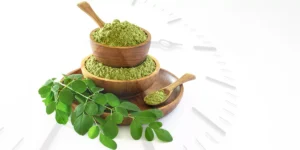





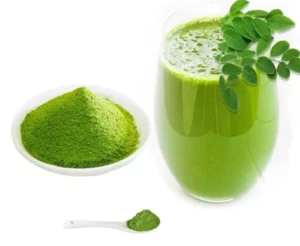


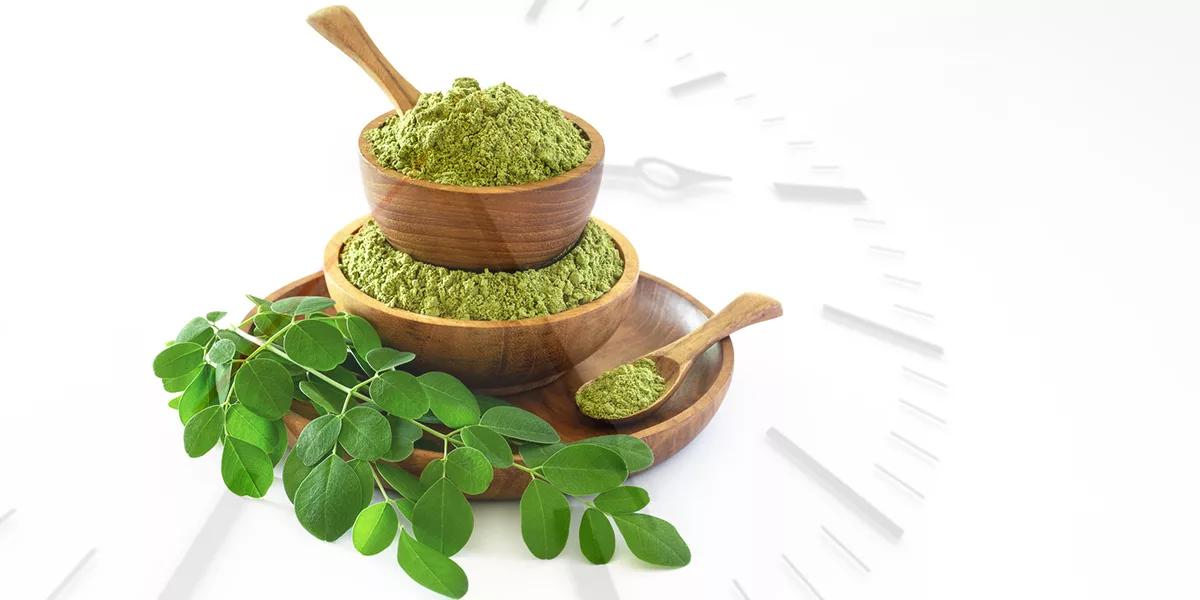

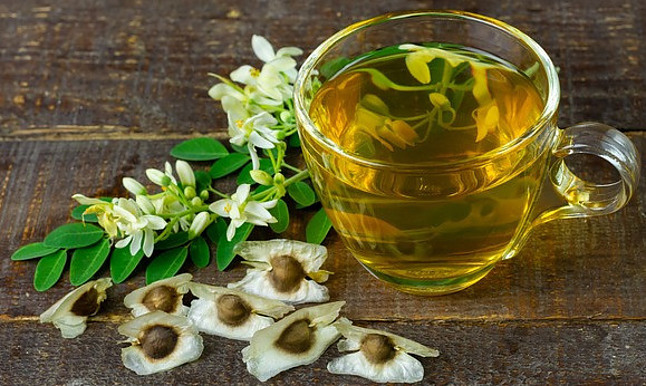
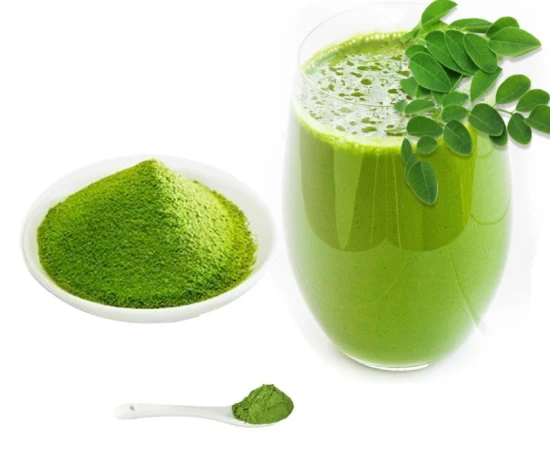



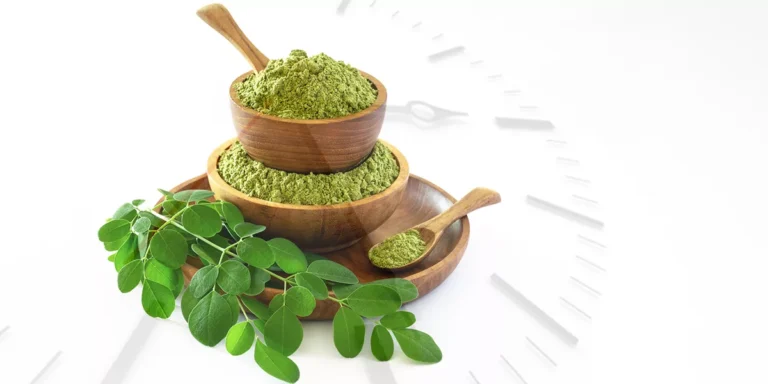

+ There are no comments
Add yours